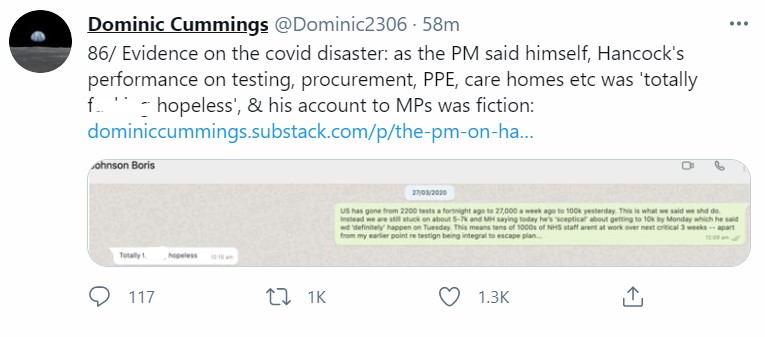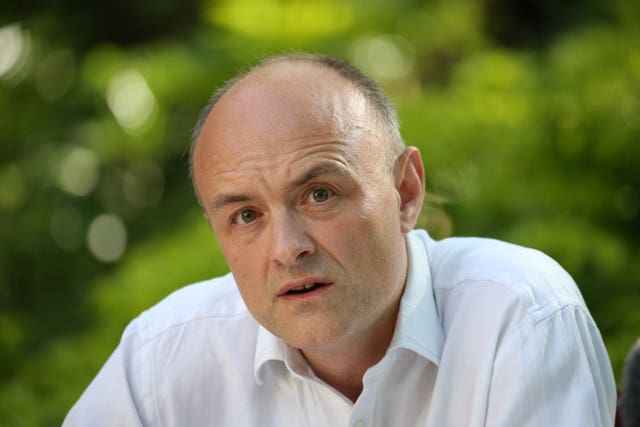Boris Johnson described Hancock as ‘totally hopeless’, according to Cummings
Mr Cummings left Downing Street in November during a bitter power struggle in No 10.

Boris Johnson twice described Health Secretary Matt Hancock as “hopeless” early in the coronavirus pandemic, according to private messages published by former aide Dominic Cummings.
Mr Cummings published a series of screenshots purportedly showing WhatsApp exchanges between himself and the Prime Minister to combat what he said are “lies” from No 10.
Downing Street did not dispute the authenticity of the messages, or most of the claims made by Mr Johnson’s former chief aide, but insisted the Prime Minister has full confidence in Mr Hancock.
The blog post exceeding 7,000 words is the latest salvo in a bitter row between the former aide, Mr Johnson and the Health Secretary, who Mr Cummings blames for many failings during the crisis.
He said the initial post shows that “No10/Hancock have repeatedly lied about the failures last year” and accused them of now trying to “rewrite history”.
Mr Cummings, who left Downing Street in November during a power struggle, accused the Prime Minister of now publicly supporting the “fiction” that he has been in agreement with the Health Secretary throughout the pandemic.
But the former chief aide argued the messages show otherwise, as do Mr Johnson’s moves to carve up some of Mr Hancock’s responsibilities and hand them to other individuals.
In one exchange on March 3 last year, Mr Cummings highlighted the US’s rapid increase of testing capacity and criticised Mr Hancock for saying he was “sceptical” about meeting a new UK target having earlier said it would “definitely” be met.
The Prime Minister apparently responded: “Totally f****** hopeless.”
Mr Cummings also published another exchange about the struggles to procure ventilators for Covid-19 patients, saying officials were turning down equipment because of price hikes.
“It’s Hancock. He has been hopeless,” the contact appearing to be Mr Johnson replied on March 27 last year.
In the wake of the blog post, Mr Hancock was asked by a reporter whether he was hopeless while in the back of a ministerial car.

“I don’t think so,” the Health Secretary replied through the window.
A source close to Mr Hancock later added: “No evidence has been provided today to back up previous unsubstantiated suggestions.”
In a separate exchange published by Mr Cummings, the Prime Minister appeared to call the situation around personal protective equipment (PPE) “a disaster” and alluded to diverting some responsibilities to Cabinet Office minister Michael Gove.
“I can’t think of anything except taking Hancock off and putting Gove on,” Mr Johnson apparently added in the conversation on April 27 last year.
But Mr Cummings described the Cabinet Office as a “total shitshow” and said the move would “have a severe risk of making it worse not better”.
“OK. Wtf do we do?,” the Prime Minister allegedly responded.
The messages are Mr Cummings’s first attempt to publish supporting evidence since his select committee appearance where he accused the Health Secretary of lying, failing on care homes and “criminal, disgraceful behaviour” on testing.
Mr Hancock has denied the Brexit campaigner’s allegations and said last week it was “telling” that he was yet to provide the joint Health and Social Care Committee and Science and Technology Committee with written evidence.
The Health Secretary said he had “no idea” why Mr Cummings had a dispute with him and wanted him fired, while No 10 has said the Prime Minister has confidence in Mr Hancock.

Mr Cummings countered this by pointing out that the Prime Minister had diverted responsibility for vaccines to Dame Kate Bingham, testing to Baroness Harding, and PPE to Lord Deighton.
When he appeared before the same committee as the former aide last week, Mr Hancock said he had seen no evidence to suggest any medics died because of a lack of PPE.
But Mr Cummings said in his blog post that the Health Secretary sought to blame NHS England chief executive Sir Simon Stevens, Chancellor Rishi Sunak and the Cabinet Office for a “PPE disaster” in April last year.
Mr Cummings alleged: “The lack of PPE killed NHS and care home staff in March-May.”
No 10 insisted Mr Johnson still has full confidence in the Health Secretary, with the Prime Minister’s official spokesman simply replying “yes” when asked during a Westminster briefing.
The spokesman did not deny the WhatsApp exchanges are genuine when asked by journalists and instead said: “Our focus is not examining those specific images but delivering on the public’s priorities.
“I don’t plan to get into the detail of what’s been published.”
Asked if the Prime Minister called Mr Hancock hopeless, the spokesman said: “I’m not planning to engage with every allegation put forward, the Prime Minister worked very closely with the health and care secretary throughout and continues to do so.”
Deputy Labour leader Angela Rayner called for the public inquiry into the handling of the pandemic to begin immediately to prevent “history being rewritten”.
“These accusations and the evidence presented about the failures at the heart of Government – and the alleged lies, dishonesty and cover-ups – are absolutely damning,” she said.
Health and Social Care Committee chairman Jeremy Hunt said Mr Cummings’ latest revelations demonstrate the Prime Minister’s “total frustration” but do not prove Mr Hancock lied.
Mr Hunt, a Conservative former health secretary, said it “is not possible to stack up the most sensational revelations without evidence”.
Mr Cummings published the details on Substack, a platform that allows people to charge for newsletters. He has said he plans to charge subscribers for insider information on subjects other than the pandemic.
Downing Street pointed to the special advisers code stating that they should “not disclose official information which has been communicated in confidence in government”.
The code also says that advisers “must continue to observe their duties of confidentiality after they have left their employment”.





